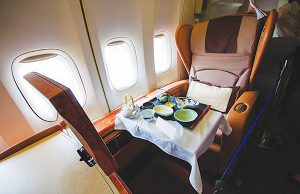Bloomberg
Flying business class has always been beyond the means of most fliers. Now even companies can’t afford fares that have soared as the world tries to reconnect in the wake of Covid.
A return business-class flight on the longest routes, between New York and Sydney, for example, can cost more than $20,000, about double the price from pre-pandemic days. “Demand is clearly outstripping supply,†said Nick Vournakis, executive vice president at corporate travel management firm CWT. “At some point, corporates are going to say enough is enough.â€
As Covid restrictions eased around the world, airlines struggled to reactivate their fleets and bring back staff fast enough to cope with the growing appetite for air travel. That’s limited capacity and seat availability. Higher fuel costs have also pushed up fares.
According to CWT and the Global Business Travel Association, business-class air fares will be up 45% in 2022 and another 6.2% next year. Business-class tickets for flights leaving the
US jumped 52% between January and August, a steeper increase than in economy and premium-economy, travel manager TripActions said.
With companies balking at the costs, corporate travel is back on shaky ground, having not yet recovered from virus-related lockdowns. That’s bad news for airlines. Business travelers represent 75% of a carrier’s profit but only 12% of passengers, according to travel software firm Trondent Development Corp.
“We are seeing a hyper-awareness around spend,†said Marcus Eklund, global managing director at corporate travel-management company FCM. Checking fares
to fly colleagues to a team gathering in Bangkok, Sydney-based
management consultant Dhruv Sharma found his budget couldn’t stretch to business class, the usual choice, without doubling to $6,000 a person. “It has to be economy,†he said.
Bill Gates, the billionaire Microsoft co-founder, predicted in late 2020 that more than 50% of business travel would disappear after the coronavirus. Qantas Airways CEO Alan Joyce put the possible decline nearer 15%. Whatever the final figure, travellers have been largely weaned off business trips because Zoom has shown what can be achieved without getting on a plane.
Corporations are now choosing flights based on price rather than airline loyalty programs in order to maximise travel budgets, said Martin Ferguson, head of public affairs for American Express Global Business Travel.
 The Gulf Time Newspaper One of the finest business newspapers in the UAE brought to you by our professional writers and editors.
The Gulf Time Newspaper One of the finest business newspapers in the UAE brought to you by our professional writers and editors.
